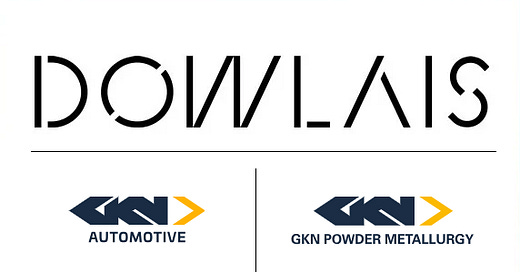Dowlais: Spinning Wheels?
Disappointing H1-24 update, but strategic review indicates a break-up is now a live catalyst.
Disclaimer
Value Situations is NOT investment advice and the author is not an investment advisor.
All content on this website and in the newsletter, and all other communication and correspondence from its author, is for informational and educational purposes only and should not in any circumstances, whether express or implied, be considered to be advice of an investment, legal or any other nature. Please carry out your own research and due diligence.
Model Portfolio name Dowlais Group Plc (DWL) reported H1-24 results last week, which disappointed the market with revenues falling -9% to £2.57bn and EBITDA down -8% to £291m YoY. The decline was primarily attributable to lower vehicle production volumes globally, driven by the well documented slowdown in EV demand. This significantly impacted DWL’s ePowertrain product line, which accounted for over 60% of the revenue decline in DWL’s core GKN Auto segment, and ~55% of the decline in total revenues overall.
The decline in EBITDA resulted in an operating margin of 5.9% (vs. 6.3% for H1-23), which in turn severely impacted FCF which declined -70% to just ~£10m vs. £33m for H1-23, which also reflected higher restructuring costs vs. PY following its spin-off from former parent Melrose Industries (MRO).
But it was the lowered guidance for H2 / full year FY24 that really disappointed, with management guiding a “mid to high single-digit adjusted revenue decline for 2024 and an adjusted operating margin between 6.0% and 7.0% at constant currency [note - vs. 6.5% margin achieved in FY23], given the benefits of commercial recoveries, restructuring savings and performance initiatives.” In addition, FCF is now guided to be lower than the PY (or sub-£93m) due to the impact of reduced vehicle volumes and higher restructuring costs.
However, there were some clear positives in the results. Firstly, DWL announced that it had disposed of the loss-making GKN Hydrogen segment for a nominal sum, which will deliver annualised cash savings of ~£15m, providing a boost to FCF going forward. Secondly and most significantly, management announced they have commenced a strategic review of the Powder Metallurgy (“PowderMet”) segment to consider a range of options, including a potential sale of the business. Readers might recall that a sale of PowderMet was one of the key catalysts I identified in my original analysis, and is an exciting development that could unlock substantial value for shareholders, as I discuss further below…



